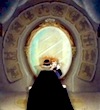Enchanted Objects: The next wave of the web
“Magic, or enchantment, is the right metaphor for the future of computing. […]
Magic is a convenient metaphor of connected things because the affordances are there. You understand the object… and this motivates the incremental function. […]
We can take a lesson from the history of the future to figure out what enchanted things will succeed or fail. The ones that satisfy primal wishes or fantasies will succeed. These primal wishes are revealed through narratives that we know and can analyze. It’s a psychology problem. Especially for Cinderella’s narcissistic stepmother. I’m not sure what robots wish for, but I can tell you what humans want:
We wish for six things that enchanted objects tend to satisfy:
For Omniscience, for human connection, for protection, for health (immortality is better), for effortless mobility or teleportation, and for expression (or creative manifestation).
These are the killer apps.”
– View video of talk
– Download talk slides
Check also David’s recent reflection on the topic of “juicy feedback,†a term that comes from game design and describes when a small action produces a surprisingly large reaction. He uses this paradigm to develop six design ideas relevant to products intended to change people’s behavior.
David’s thinking was inspiring for an article in this month’s Wired Magazine, which argues that by providing people with information about their actions in real time, you give them a chance to change those actions, and push them toward better behaviors.
David Rose is a product designer, technology visionary, and serial entrepreneur.
Currently David is Chief Executive at Vitality, a company that is reinventing medication packaging with wireless technology.
Rose founded and was CEO of Ambient Devices where he pioneered glanceable technology: embedding Internet information in everyday objects like light bulbs, mirrors, refrigerator doors, digital post-it notes, and umbrellas to make the physical environment an interface to digital information.
Rose founded Viant’s Innovation Center, an advanced technology group for Fortune 500s including Sony, GM, Schwab, Sprint and Kinkos. He helped build Viant to over 900 people, $140M and a successful IPO.
In 1997 Rose patented online photo-sharing and founded Opholio (acquired by FlashPoint Technology).
Before the Internet he founded and was President of Interactive Factory (acquired by RDW Group) which creates interactive museum exhibits, educational software and smart toys, including the award-winning LEGO Mindstorms Robotic Invention System.
Rose taught information visualization at the Harvard Graduate School of Design and currently teaches a popular course in tangible user interfaces at the MIT Media Lab. He is a frequent speaker to corporations and design and technology conferences.




